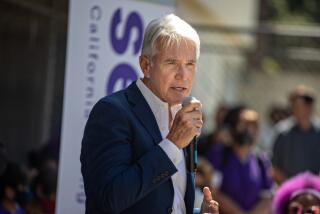‘Jena Six’ teenager is freed on bail
- Share via
A black teenager jailed in the racially combustible “Jena Six” case was released Thursday, hours after the prosecutor announced that he would no longer seek to try him as an adult.
Mychal Bell, 17, had spent nearly 10 months behind bars after he and five other black youths allegedly assaulted a white classmate last year at Jena High School in Louisiana.
The incident capped months of unrest in the small town. Last September, white students hung nooses from an oak tree on campus a day after a black freshman sat under it. The three students who hung the nooses were given three days’ suspension, and white youths involved in racially charged fights off campus received minimal punishment.
LaSalle Parish Dist. Atty. Reed Walters initially charged five of the six black teens as adults with attempted second-degree murder -- charges that could have put them in prison for up to 50 years. He later lowered the charges to aggravated battery, a felony that still could put them behind bars for up to 15 years. Bell’s conviction was overturned this month on the grounds that he should have been tried as a juvenile. (He was 16 at the time.)
“You cannot have adult attempted murder for some, and a fine for others,” the Rev. Al Sharpton said shortly after Bell’s release as he and other African American leaders stood beside the teen at a news conference outside the LaSalle Parish Courthouse.
Calling the Jena Six case a new chapter in the civil rights struggle, Sharpton added, “Upon this young man’s shoulders is a movement.”
The Jena Six case attracted international news coverage and became a call to action for activists on the Internet and college campuses, who saw it as proof that black youths still face a double standard in the American legal system. In a scene recalling the civil rights marches of the 1960s, an estimated 20,000 people went to Jena last week to peacefully protest the case.
On Thursday, the Congressional Black Caucus joined the chorus, calling Walters’ actions “an abuse of prosecutorial discretion” and asking the Justice Department to investigate.
Donald Washington, the region’s federal prosecutor, is monitoring the situation, and the FBI is tracking Internet postings by white supremacists threatening the families of the six teens.
In a televised news conference stacked with his cheering supporters Thursday, Walters said that political pressure and nationwide outrage played no part in his decision to retry Bell as a juvenile.
“To do my job well, a prosecutor must develop a thick hide against outside influences,” Walters said. He added that after consulting with the family of the assault victim, Justin Barker, and legal experts, he decided to resolve the case more quickly rather than dragging appeals out in court.
Near the end of the news conference, Walters said he felt that prayer had allowed him and the rest of the community to endure the stress of events surrounding the case.
And, in remarks that angered some organizers of last week’s march, he added:
“I firmly believe and am confident of the fact that had it not been for the direct intervention of the Lord Jesus Christ last Thursday, a disaster would have happened. You can quote me on that.” When asked to clarify, Walters said: “The Lord Jesus Christ put his influence on those people, and they responded accordingly.”
Some civil rights activists said his remarks suggested that he expected the demonstrators would resort to violence, and that it was insulting to credit their peaceful behavior to divine intervention.
Several hours after Walters’ news conference, Bell was free.
A judge set terms for his release, and a $45,000 bond was posted. Bell appeared with Sharpton and others on the courthouse steps but did not speak; later, he went home, where his family and supporters celebrated.
Bell, the only one of the Jena Six to be tried so far, was convicted of aggravated battery and conspiracy to commit aggravated battery earlier this year by an all-white jury. But a new team of defense attorneys argued that he was unlawfully tried as an adult, and an appeals court vacated the verdict this month.
Walters, who argued in a New York Times opinion piece this week that the brutality of the six-on-one assault merited strong punishment, initially said he would ask the Louisiana Supreme Court to overturn that decision.
But on Wednesday evening, Louisiana Gov. Kathleen Babineaux Blanco, flanked by Sharpton and other African American activists, announced that she had spoken with Walters and that he would no longer seek to prosecute Bell as an adult. As a result, the steepest punishment Bell could now face is being sentenced to a detention center until he turns 21.
Critics of the case said they were pleased that Walters conceded that Bell should be tried as a juvenile. But they said justice would not be served until all of the Jena Six charges were reduced to misdemeanors.
“Reed Walters did what I thought he would do. He backed down, because pressure was exerted on him from high places in Louisiana,” said Alan Bean, director of Friends of Justice, a civil rights group in Texas that was among the first to draw attention to the case.
“But I still don’t think we’ve gotten the case where it needs to be. The issue for me has always been whether these young men would be able to move on with the rest of their lives, or whether they would be burdened by felony charges forever.”
--
More to Read
Sign up for Essential California
The most important California stories and recommendations in your inbox every morning.
You may occasionally receive promotional content from the Los Angeles Times.










